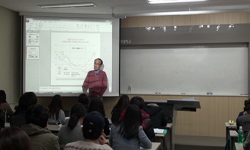Purpose: This study examined the impact of adolescents’ dietary behavior on their quality of life using the nutrition quotient for adolescents (NQ-A) for some high school students in Seoul. Methods: The subjects were 176 high school students living...
http://chineseinput.net/에서 pinyin(병음)방식으로 중국어를 변환할 수 있습니다.
변환된 중국어를 복사하여 사용하시면 됩니다.
- 中文 을 입력하시려면 zhongwen을 입력하시고 space를누르시면됩니다.
- 北京 을 입력하시려면 beijing을 입력하시고 space를 누르시면 됩니다.
https://www.riss.kr/link?id=A109129064
- 저자
- 발행기관
- 학술지명
- 권호사항
-
발행연도
2024
-
작성언어
Korean
- 주제어
-
KDC
594
-
등재정보
SCOPUS,KCI등재
-
자료형태
학술저널
- 발행기관 URL
-
수록면
320-335(16쪽)
- 제공처
-
0
상세조회 -
0
다운로드
부가정보
다국어 초록 (Multilingual Abstract)
Methods: The subjects were 176 high school students living in Seoul. The NQ-A was used to assess the dietary quality, and the quality of life was assessed by categorizing it into life satisfaction, environment, health, participation and safety, leisure activities, and emotional factors using survey questions validated through previous studies.
Results: The NQ score of the survey subjects was 49.30 points. Based on the NQ scores, 7.4%, 46.6%, and 46.0% of participants were categorized as the ‘high’, ‘medium’, and ‘low’ groups, respectively. The total NQ score and balance, diversity, and practice factor scores were positively correlated with life satisfaction, environment, health, participation and safety, and leisure activities among the quality of life subscales. Regression analysis showed that the total NQ score was positively associated with life satisfaction, health, leisure activities, and emotions; the moderation factor was negatively associated with life satisfaction and health. The balance factor was positively associated with the environmental factor. The practice factor was positively associated with health, leisure activities, and emotions, and the environment factor was negatively associated with emotions.
Conclusion: These results show that adolescents’ quality of life is closely related to their diet, so it is necessary to maintain a balanced and varied food intake and desirable eating behaviors to improve adolescents’ quality of life. Furthermore, adolescents’ quality of life is influenced by other factors. Therefore, further research is needed to assess the quality of life, including dietary factors, as well as physical, emotional, psychological, and social development.
Purpose: This study examined the impact of adolescents’ dietary behavior on their quality of life using the nutrition quotient for adolescents (NQ-A) for some high school students in Seoul.
Methods: The subjects were 176 high school students living in Seoul. The NQ-A was used to assess the dietary quality, and the quality of life was assessed by categorizing it into life satisfaction, environment, health, participation and safety, leisure activities, and emotional factors using survey questions validated through previous studies.
Results: The NQ score of the survey subjects was 49.30 points. Based on the NQ scores, 7.4%, 46.6%, and 46.0% of participants were categorized as the ‘high’, ‘medium’, and ‘low’ groups, respectively. The total NQ score and balance, diversity, and practice factor scores were positively correlated with life satisfaction, environment, health, participation and safety, and leisure activities among the quality of life subscales. Regression analysis showed that the total NQ score was positively associated with life satisfaction, health, leisure activities, and emotions; the moderation factor was negatively associated with life satisfaction and health. The balance factor was positively associated with the environmental factor. The practice factor was positively associated with health, leisure activities, and emotions, and the environment factor was negatively associated with emotions.
Conclusion: These results show that adolescents’ quality of life is closely related to their diet, so it is necessary to maintain a balanced and varied food intake and desirable eating behaviors to improve adolescents’ quality of life. Furthermore, adolescents’ quality of life is influenced by other factors. Therefore, further research is needed to assess the quality of life, including dietary factors, as well as physical, emotional, psychological, and social development.
동일학술지(권/호) 다른 논문
-
Effects of distractions such as audio, audiovisual, and hand-use on food intake and satiety ratings
- 한국영양학회
- Sukkyung Shin
- 2024
- SCOPUS,KCI등재
-
- 한국영양학회
- Ji-Sook Park
- 2024
- SCOPUS,KCI등재
-
한국 청소년의 과일 및 채소 섭취와 관련된 인구사회학적 특성 및 식생활 분석: 국민건강영양조사 제7–8기 (2016–2019) 자료 이용
- 한국영양학회
- 윤보경(Bokyeong Yun)
- 2024
- SCOPUS,KCI등재
-
중년 남성과 여성의 건강 관련 삶의 질에 따른 건강 및 식생활 특성: 2019년, 2021년 국민건강영양조사 자료를 이용하여
- 한국영양학회
- 김사림(Sarim Kim)
- 2024
- SCOPUS,KCI등재






 DBpia
DBpia






